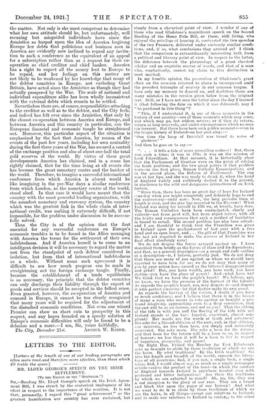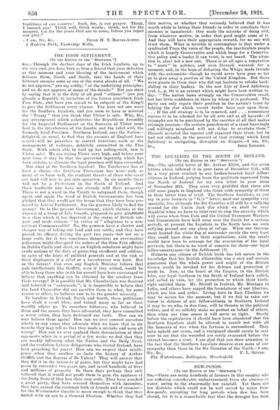LETTERS TO THE EDITOR.
[Letters of the length of one of our leading paragraphs are often more read,and therefore more effective, than those which fill treble the space.] MR. LLOYD GEORGE'S SPEECH ON THE IRISH SETTLEMENT.
[To THE EDITOR OP THE " SPECTATOR."] SIR,—Reading Mr. Lloyd George's speech on the Irish Agree- ment Bill, I was struck by the oratorical inadequacy of his effort in respect to the importance of the occasion. It is not that, personally, I regard this " great achievement" as the greatest humiliation our country has ever sustained, but
simply from a rhetorical point of view. 1 wonder if any of those who read Gladstone's magnificent speech on the Second
Reading of the Home Rule Bill, or those, still living, who enjoyed the privilege of hearing it, contrasted the two speeches of the two Premiers, delivered under curiously similar condi- tions, and, if so, what conclusions they arrived at? I think that the comparison is extraordinarily interesting both from a political and literary point of view. In respect to the latter, the difference between the phraseology of a great classical scholar and an exquisite master of words, and that of a man who, emphatically, cannot lay claim to this distinction is most marked.
In my humble opinion the peroration of Gladstone's great effort on the occasion referred to above is unsurpassed amid the proudest triumphs of oratory in our common tongue. I have only my memory to depend on, and doubtless there are many mistakes in the version given below from the original text. Still, as I have not seen the latter since the day I learned it (that following the date on which it was delivered), may I " be pardoned in this thing "?
"This, if I understand it, is one of those moments in the history of our country—one of those moments which may come, and which may go, but seldom return; or if they do return, return at long intervals, and under circumstances which no man can forecast. But there have been such golden moments—even in tho tragic history of Ireland—as her poet sings One time the harp of Innisfail was tuned to notes of gladness.' "
And then he goes on to say:-
. . it tells a tale of more prevailing sadness! But, there was such a time; it was in 1795; it was on the mission of Lord Fitzwilliam. At that moment, it is historically clear that the Parliament of Grattan were on the point of solving the Irish problem; and the two great points of that problem wore -in the first place, Roman Catholic Emancipation; and in the second place, the Reform of Parliament. The cup was at her lips, and she was ready to drink it, when the hand of England rudely and ruthlessly dashed it to the ground, in obedience to the wild and dangerous intimations of an Irish faction.
" Since then, there has been no great day of hope for Ireland —no day when you might completely and definitely hope to end the controversy—until now : Now, the long periodio time at length is over, and the star has mounted to the Heavens! What Ireland was doing for herself in 1795 we, at length, have done. The Roman Catholics have been emancipated, slowly and sullenly—not from good will, but from abject terror, with all the fruits and consequences that such a method of legislation is bound to entail. The second problem has also been solved: and I am .thankful to think that the Franchise was given to Ireland upon the readjustment of last year with a free hand and an open heart, and the gift of that Franchise was the last act required to make tho success of Ireland in her final effort absolutely sure I Wo do not despise the forces arrayed against us. I have described them briefly as the forces of class and its dependents; and that, as a general description—as a rough and rude outline of a description—is, I believe, perfectly just. We do not deny that there are many of you against us whom wo should have expected to have been for us; wo do not deny that many of you by your action have caused us the bitterest disappointment and grief I But, you have wealth, you have rank, you have station—you have the place of power! And—what have we? Wo think that we have the people's heart! Wo believe, aye, we know, we have the promise of the harvest of the future! As regards the people's heart, you may dispute it—and dispute it with perfect sincerity—let that matter make its own proof.
As regards the harvest of the future. I doubt if you have so much confidence; and I believe that there is in the breast of many a man who means to vote against us to-night a pro- found misgiving, approaching even to a deep conviction, that the end will be as we foresee, and not as you! That the ebbing of the tide is with you and the flowing of the tide with us! Ireland stands at the bar : hopeful, expectant, almost sup- pliant! Her words are the words of truth and soberness! She asks for a blessed oblivion of the past; and, in that oblivion, cur interests, no less than here, are deeply and intimately concerned. She asks more. She asks a boon for the future; and that boon for the future will be a boon to us, in respect of honour; no less than it will be a boon to her in respect of happiness, prosperity, and peace! My Right Hon. Friend the Member for East Edinburgh asks us to-night to abide by those traditions of which wo are the heirs. By what traditions? By the Irish tradition? Go into the length and breadth of the world; ransack the litera- ture of all countries; find, if you can, a single book, n single voice; find, I would almost say, as much as a single newspaper article—unless the product of the hour—in which the conduct of England towards Ireland is anywhere treated save with profound and bitter indignation! Are these the traditions by which we are exhorted to stand? Ali, no, Sir, they are a sad exception to the glory of our race. They are a broad and black blot upon the pages of our history ! And what wo want to do is to abide by those traditions of which we are the heirs, in all things—except our relations to Ireland; and to make our relations to Ireland to eonfon..: to the other traditions of our country! Such, Sir, is our prayer. Think, I beseech you! Think well, think wisely; think, not for the moment, but for the years that are to come, before you reject our plan."
1 Madeira Park, Tunbridge Wells.



































 Previous page
Previous page